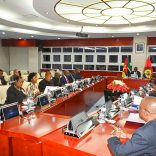Mozambique: President Chapo swears in members of the State Council
Mozambique: Donors and lenders tighten the screws

The United States said on Monday that it “endorsed the recent decision by the group of 14 countries (G14) providing general budget support to suspend such assistance until they are provided more clarifications and accountabilities.” It also said it was “reviewing our aid, in particular any aid to the government.” The US has never been a budget support donor, and provides its largest support to the health sector. “Most of this assistance directly benefits the people of Mozambique, and the United States does not wish to reduce this assistance.” The US says it is the largest bilateral donor to Mozambique.
http://portuguese.maputo.usembassy.gov/dividademocambique.html
Donors and lenders met with the government last week and laid down a hard line. They stressed that it is for the government to present a clear roadmap or preliminary action plan, built around three key phrases: transparency, corrective measures and accountability. The first two of these were emphasised by the US in its statement Monday: “the government must now act quickly to publicly account in a full and transparent way for these loans and how the funds were used, as well as outlining a plan to mitigate its impact on the economy of Mozambique.”
Transparency means providing a complete list of government guaranteed debts – it is believed that there are more which have not been revealed – and documenting in detail what the money has been used for. With Ematum, donors were satisfied when the IMF forced the loan onto the government books, without actually asking for an accounting of how the money was used. But with two new secret loans revealed, this is no longer enough, and donors are demanding that government at least reveal in some detail what the money was used for.
Corrective measures mean filling the financial hole (of which more below), and a range of measures to make public enterprises more accountable, make sure procurement follows the rules, and ensure that there are more public and detailed evaluations of future investments.
Accountability is more complex. Some donors and lenders want forensic audits, which would identify corrupt payments and where they money went. In past corruption cases, Mozambique has only allowed one forensic audit and it was never allowed to be used (of which more below). Some donors want Guebuza named, shamed and prosecuted, while others realise this is unlikely. There are rumours that some in Frelimo want to offer former Finance Minister Manuel Chang as the scapegoat.
Some donors now argue that there has been such good will toward Mozambique that the country has been allowed to get away with past corruption scandals. One admitted: “donors have not wanted to accept that this is not a success story. So much has been invested that they do not want to lose face – or their own hopes.” But many donor representatives feel personally offended – government ministers and officials lied to them about low levels of military spending and about investments. They say the Mozambique leadership does not yet realise how serious has been the smashing of trust, and how this will have in impact in their home capitals.
A full renewal of aid will be dependent on Mozambique having an IMF programme. The previous one was based on misleading data from the government, so the IMF will want to start from scratch, and this could take more than a year. But the IMF will surely demand harsh austerity measures and tight controls of both government spending and the money supply. Investment will be frozen, wages might be cut, and devaluation will continue, raising Maputo food prices (which in the past has caused riots).
By: Joseph Hanlon













Leave a Reply
Be the First to Comment!
You must be logged in to post a comment.
You must be logged in to post a comment.